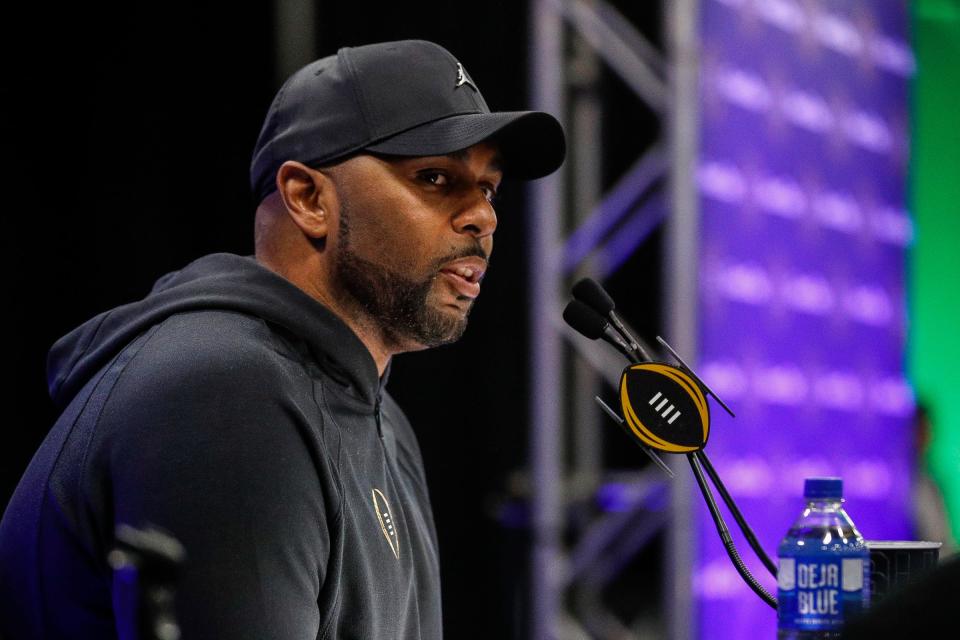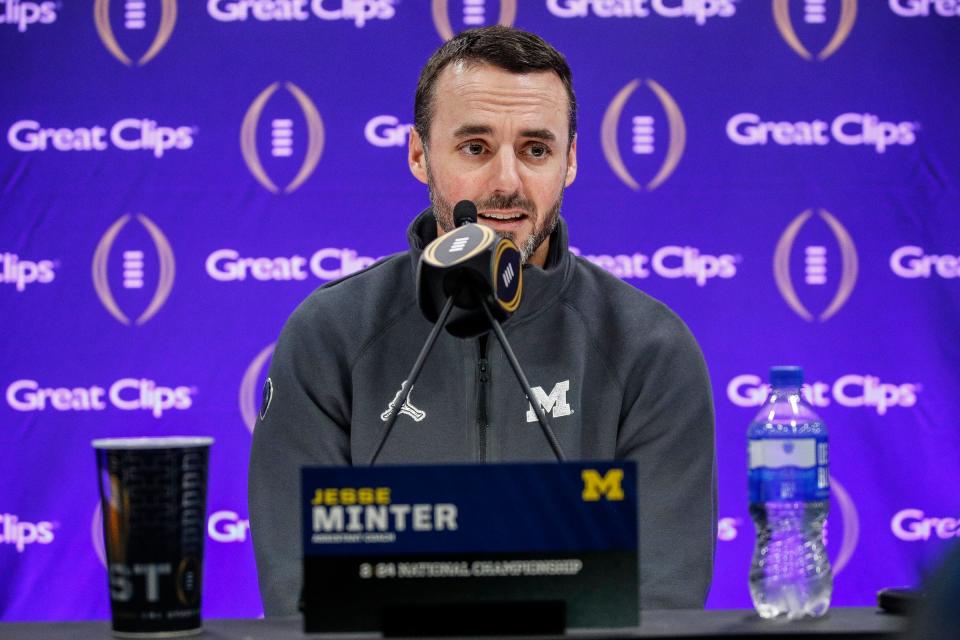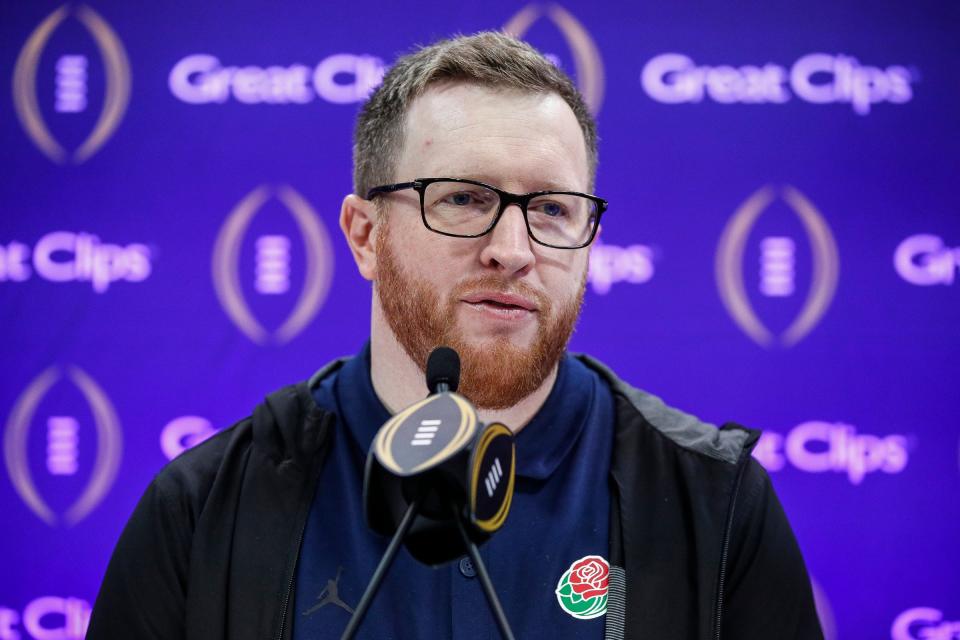How did Michigan football get to the cusp of a national title? Start with Jim Harbaugh's staff
HOUSTON — The spotlight is usually reserved for Jim Harbaugh.
But on Saturday morning, roughly 57 hours before Michigan football faces Washington in the College Football Playoff championship game for the greatest prize of all, the Wolverines’ young brigade of assistants received a little shine as well. One by one, they took their turn on the dais inside Hall A of the George R. Brown Convention Center at the team’s media day. Jesse Minter. Sherrone Moore. Mike Hart. Steve Clinkscale. Kirk Campbell. And Harbaugh’s own son, Jay, the longest-tenured member of the group. They were front and center because Harbaugh wanted them there.
“Like Moses,” he said, “I'm going to die leaning on my staff.”

THE MATCHUP: Michigan DBs know battle with Washington passing attack is 'gonna come down to us'
This was Harbaugh hyperbole at its finest. But there was a kernel of truth packed into his melodramatic statement because he wouldn’t be here, on the cusp of a national title, in the CFP title game, without them or some of their immediate predecessors.
After all, they were the men who helped Michigan rebound from the blight of 2020, when the program had lost its way during a disastrous 2-4 season. They were the guys who revamped the culture within Schembechler Hall and ignited a rebirth. They were the ones who installed a new defense, allowed Harbaugh to return to his roots and implemented the winning formula that has produced 39 victories in Michigan’s past 42 games.
“It’s the best staff I’ve been on,” said Clinkscale, a 23-year veteran who oversees the defensive backs. It’s been extremely enjoyable. You see where we are now. So, it is paying off.”
The Wolverines have become a well-oiled machine that plays with relentless spirit and precision. No team in the Football Bowl Subdivision has averaged fewer penalties than Michigan. Only two have committed fewer turnovers than U-M. The crisp execution, as the Wolverines’ opponents have come to discover, spans multiple units. The offense is among the nation’s leaders in fourth-down conversions, with a success rate just above 80%. The defense is ranked No. 1 in both points and yards allowed. Perhaps most impressive of all, they remained undefeated, weathering two separate three-game Harbaugh suspensions with four different assistants serving in his stead.
Add it all up, and the numbers show a well-coached team that has become greater than the sum of its parts.
“When you all have the same vision and the same goal,” Moore said, “you get great outcomes.”
Never was that more obvious than the Rose Bowl semifinal, when Michigan toppled Alabama, 27-20, in overtime. Moore kept the Crimson Tide off balance by deploying multiple personnel packages, extracting production from unusual sources, changing formations and making one savvy call after another. He helped spring running back Blake Corum wide open for a 8-yard touchdown catch in the first quarter. He then had the gumption to attempt an audacious throwback pass that netted a 20-yard gain and extended another scoring drive late in the second quarter. Moore’s work was surpassed only by his defensive counterpart, Minter, who concocted an ingenious game plan to stop Alabama and its dual-threat quarterback, Jalen Milroe. Milroe was sacked six times and the Crimson Tide manufactured only 288 yards — their lowest output of the season.
After Milroe was stoned 2 yards short of the end zone on the final play of the game, Harbaugh was jubilant.
“We’re so together, so connected,” he gushed.

MORE FROM RAINER SABIN: 1 of Michigan football's old enemies revived Washington. He may have changed U-M, too.
That’s particularly true within Harbaugh’s staff, where Moore and Minter play off each other. Moore’s desire to control the time of possession helps maintain the integrity of Minter’s defense by preserving the stamina of his players and limiting their exposure. No team has faced fewer plays per game than Michigan.
The synchronicity, according to Jay Harbaugh, is a byproduct of the staff’s burning desire to just win, baby. Personal ambitions are suppressed for the greater good of the team. Sure, he said, receivers coach Ron Bellamy may want the wideouts to make more catches and Mike Elston, who oversees the defensive line, would love for edge defenders to get more sacks. As the special teams coordinator, he even wishes his returners would pile up more yards.
“But none of us wants those things more than we want to win,” Jay Harbaugh said.
It wasn’t always this way. Back in 2020, Michigan seemed hell-bent on making former coordinator Josh Gattis’ “Speed in Space” offense work. The core principles of Harbaugh’s program were sacrificed in the process. Over time, the team lost its edge, the ground game withered and the defense faltered. ESPN analyst Kirk Herbstreit couldn’t understand what happened as he watched Wisconsin demolish Michigan, 49-11, in an empty Big House as the COVID-19 pandemic raged.
“Wow. That’s different,” Herbstreit remembered thinking. “But maybe he’s adjusting to the new game.”
In reality, he lost his identity. But Harbaugh quickly rediscovered it. He tore out the guts of his staff and sought new blood. He added the precocious Mike Macdonald to overhaul the defense that crashed in Don Brown’s final year as coordinator. He also brought back Bellamy and Mike Hart, two alums who had played for Lloyd Carr. They infused Schembechler Hall with a youthful energy, fostering a collaborative environment where the coaches and players bonded.
“They could relate to us a little better,” guard Trevor Keegan said.
Armed with emotional intelligence, they built trust among a scarred group of Wolverines. The buy-in was immediate during the 2021 offseason, triggering the ascent that has brought Michigan near the mountaintop of college football.
“You can feel it,” Bellamy said. “You can see it. Like, how well are you meshing with the players? We know our kids. We know what gets them going. They feel it; they feel the love.”

That affection is also palpable among Bellamy and his co-workers. Some of the names and faces have changed over the past three years. But among the principal assistants who helped trigger Michigan’s revival, only Macdonald left, and the impact of his departure was mitigated by the arrival of Minter, his good friend and former colleague with the Baltimore Ravens.
The continuity has been essential to Michigan’s rise. Recent additions such as Campbell and Elston, another Michigan alum, have seamlessly integrated within the staff. So has Grant Newsome, a former player and grad assistant who supervises the tight ends.
“The chemistry is unbelievable,” Clinkscale noted.
It may be Michigan’s secret ingredient.
Harbaugh doesn’t deny that.
Over the course of the season, he has gone out of way to praise each of his 10 assistants.

He did so again Saturday, when everybody came out to see him here in Houston.
“They’ve been tremendous,” he said. “I could talk about every guy on the staff.”
But there was no need. On this day, most of them had a turn at the microphone because Harbaugh gave it to them. Considering all they have contributed, they deserved it.
Contact Rainer Sabin at rsabin@freepress.com. Follow him @RainerSabin.
This article originally appeared on Detroit Free Press: Michigan football rose to CFP heights with this secret ingredient
